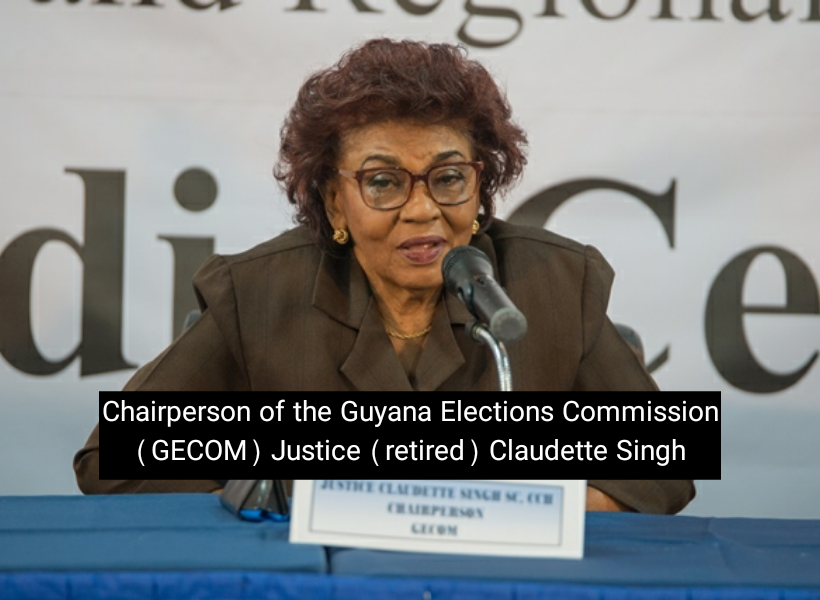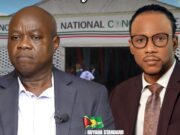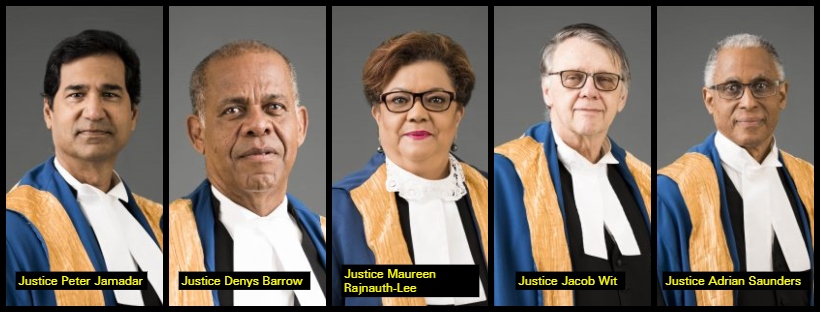By Feona Morrison
When one is to examine the reasoning behind a decision by GECOM Chairperson retired, Judge Claudette Singh that allegations of dead people and migrants voting which were complained of by APNU agent, Joseph Harmon should be addressed by an election petition filed in the High Court, one would come to the inescapable conclusion that she was perfectly entitled and right to take this position.

The foregoing is the firm conviction of the Caribbean Court of Justice (CCJ), Guyana’s final court of appeal, which, in a unanimous judgment delivered yesterday quashed a majority ruling by the Court of Appeal which inserted the word ‘valid’ in rendering an interpretation of Article 177 (2) (b) of the Constitution.
In overturning the decision of the lower Court, the CCJ held that the Court of Appeal exceeded its jurisdiction when it heard and determined the case since the questions raised in an application filed by government supporter, Eslyn David, who sought to block the declaration of elections results by challenging the credibility of votes certified during the Recount exercise, did not invoke the provisions of Article 177 (4) of the Constitution as the questions raised did not depend on the qualification of any person for election or on the interpretation of the Constitution.
The five-member panel of judges led by the Court’s President Justice Adrian Saunders, all agreed that the provisions of this Article only become operable after a President is elected, and not before or during the electoral process as was being contended by David. Moreover, the CCJ also nullified a report dated June 23, 2020 by Chief Elections Officer (CEO), Keith Lowenfield in which he invalidated some 115, 000 votes on the basis of the irregularities reported by Harmon.
The Court ruled that the CEO’s action was unilateral and unlawful, which therefore rendered it unconstitutional. In its 60-page unanimous judgment, the CCJ addressed with much passion a number of issues, one of them being Justice Singh’s assertion of GECOM being without the powers of a Court of Law to investigate the irregularities, and that the issues, although serious, are matters for determination by the elections Court.
The Regional Court held that Article 163 of the Constitution confers exclusive jurisdiction upon the High Court, to determine, among other matters, any question in relation to whether an election has been lawfully conducted or the result affected by any unlawful act or omission was naturally unaffected by Order No. 60 of 2020 which governs the recount of all ballots cast in March 02, 2020 general and regional elections.
According to the CCJ, this Article is constitutional in character and it establishes a comprehensive regime for challenges to the election. More so, the Court said that Paragraph 4 of Article 163 provides that Parliament may make provision for how this jurisdiction of the High Court is to be exercised with the passing of the National Assembly (Validity of Elections) Act.
The Court explained that among other things, the Validity Act provides that the method of questioning the validity of an election is by an election petition, and that this shall be presented within 28 days after the results of the election are published in the Gazette under Section 99 of the Representation of the People Act.
Further to that, the Court explained that the Validity Act also provides that, in a trial initiated by an election petition, the High Court can declare that the number of valid votes cast for a list of candidate differs from the number of votes upon which seats in the National Assembly were allocated, and also that the High Court can order a fresh election in whole or in part .
It is against this background, the CCJ held that there , therefore exists a constitutionally mandated and evidence based open justice process placed under the exclusive jurisdiction of the High Court with a right to appeal, if necessary, to the Court of Appeal and ultimately up to the CCJ. This process, and utilisation of it, are fundamental to the electoral system, the legitimacy of elections and democratic governance in Guyana, the CCJ noted.
In light of the foregoing, the CCJ underscored, “The jurisdiction conferred by Article 163 is capable of addressing the allegations of irregularities complained of by Mr. [Joseph] Harmon and alluded to by the [Chief ELections Officer]. The Chairperson of GECOM was therefore perfectly entitled and right to take the position that these allegations, if pursued, should be addressed by an election petition filed in the High Court as contemplated by Article 163.”
“Neither GECOM nor the Court of Appeal is entitled to trespass on the exclusive jurisdiction of the High Court in this regard. The Chairperson was also right to note that GECOM lacks the legislative authority and the machinery to adjudicate those irregularities,” the apex Court noted in conclusion.













